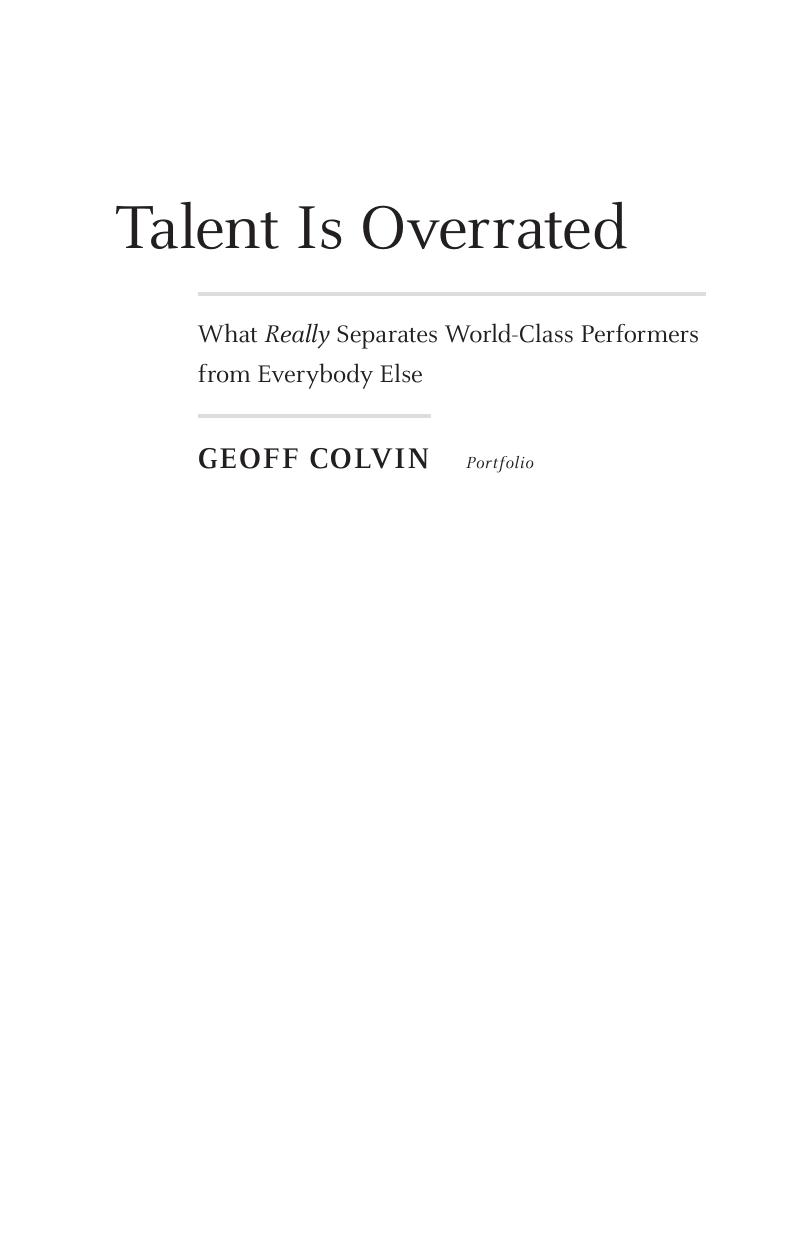Talent Is Overrated by Geoff Colvin

Author:Geoff Colvin
Language: eng
Format: mobi, epub, pdf, azw3
ISBN: 9781591842248
Publisher: Penguin Group USA, Inc.
Published: 2010-09-24T10:00:00+00:00
Excellent chess players practice by studying positions from real games between top-level players, organized by various themes—openings, end-games, attacks, defenses, and many other categories that are far more refined. Thousands of books of such positions have been published. The practice routine is to study a particular position and choose the move you would make, then compare it with the move chosen by the master; if they’re different, figure out why and which is better.
This is practice of a different type, but it still fulfills the requirements of well-structured deliberate practice: It is designed to meet the central demands of the field, in this case move selection, and can be further focused on the types of moves that need to be improved; and it involves high repetition and immediate feedback. Many elements of job performance can be improved through a similar approach.
In fact, the chess model has been used widely in business education for eighty years, but under a different name: the case method. Pioneered at the Harvard Business School, it is strongly analogous to chess practice: You’re presented with a problem, and your job is to figure out a solution. Real life being the way it is, you often won’t know whether the solution chosen by the case’s protagonist was the best one possible, or whether yours was any better. But the process of focusing on the problem and evaluating proposed solutions is powerfully instructive, which helps explain why the case method is used by hundreds of universities around the world.
One of the great strengths of this approach is that it can be focused sharply on specific skills that need improvement, in keeping with deliberate practice principles. You might work in marketing for years and get only a couple of chances to market U.S. products in China, for example, so that’s a skill you probably wouldn’t be very good at. But in a short time you could study a dozen cases about marketing U.S. products in China. That’s one step removed from actually marketing the products, but it puts you many steps ahead of anyone who has not studied that specific skill intensely and repeatedly.
One way to apply the chess model is to take business classes that use the case method. That option isn’t always available, but it holds many advantages. Since the correct response to the case problem isn’t always clear, it’s helpful to hear the perspectives of other students and especially of the teacher, who may be the writer of the case. Classes also typically expose students to a lot of cases; students at the Harvard Business School study more than five hundred of them during the two-year program.
If you can’t go to business school or take business classes, you can still apply the chess model ad hoc. For starters, many of the case studies used at famous business schools worldwide are for sale; you can buy them online and study them yourself. More generally, consciousness of the chess model changes the way you read the news or observe what happens in your own industry or the company where you work.
Download
Talent Is Overrated by Geoff Colvin.epub
Talent Is Overrated by Geoff Colvin.pdf
Talent Is Overrated by Geoff Colvin.azw3
This site does not store any files on its server. We only index and link to content provided by other sites. Please contact the content providers to delete copyright contents if any and email us, we'll remove relevant links or contents immediately.
| Business School Guides | GMAT |
| Guides | Interviewing |
| Job Hunting | Job Markets & Advice |
| Resumes | Vocational Guidance |
| Volunteer Work |
The Motivation Myth by Jeff Haden(5202)
Audition by Ryu Murakami(4919)
Adulting by Kelly Williams Brown(4561)
The Confidence Code by Katty Kay(4244)
A Mind For Numbers: How to Excel at Math and Science (Even If You Flunked Algebra) by Barbara Oakley(3293)
Waiting in the Wings by Melissa Brayden(3207)
Self-Esteem by Matthew McKay & Patrick Fanning(3132)
Fooled by Randomness: The Hidden Role of Chance in Life and in the Markets by Nassim Nicholas Taleb(3103)
The ONE Thing by Gary Keller(3057)
Nice Girls Don't Get the Corner Office by Lois P. Frankel(3034)
The Dictionary of Body Language by Joe Navarro(2986)
How to be More Interesting by Edward De Bono(2787)
Designing Your Life by Bill Burnett(2731)
Getting Things Done by David Allen(2688)
The Plant Paradox by Dr. Steven R. Gundry M.D(2599)
Police Exams Prep 2018-2019 by Kaplan Test Prep(2537)
What Color Is Your Parachute? 2015 by Richard N. Bolles(2299)
Dangerous Personalities by Joe Navarro(2281)
When to Jump by Mike Lewis(2239)
